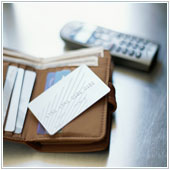
A new phenomenon in the tech world ties your wallet together with your smartphone. This rising trend, commonly known as a digital wallet, is gaining popularity and a number of recently launched systems are being adopted by large companies. It looks like the days of carrying cash, credit and debit cards around may be numbered.
What exactly is a digital wallet?
A digital wallet is the idea of digitizing your credit and debit cards and using a smartphone app to access the accounts, with credit card numbers and information stored in the cloud. You can then use your phone in place of a card when you purchase something at a store, usually by swiping the phone over a special sensor and entering your pin.
If you’re a Starbucks fan, you may already use their mobile app to load money into your account and then simply scan your phone to pay for coffee. A digital wallet is a similar concept, the difference being that the card scanned is essentially a digital version of your normal bank card, or is linked to your bank account and works much the same way as a debit card.
The technology behind this is largely built on Near Field Communication (NFC). NFC is a radio based technology that allows users to transmit data between two devices when they are placed in close proximity. With digital wallets, either your smartphone or a device that attaches to your phone has an NFC chip in it, allowing it to talk to a related receiver. Another version of the digital wallet system utilizes a dongle which is attached to a phone, allowing the phone to function as a credit card (or a card reader if you’re a vendor).
After you swipe your phone, the vendor’s system takes over and interacts with your bank or credit card provider, usually via the Internet, to complete the transaction.
What are some options available for my business?
While the concept is still somewhat in its infancy, digital wallets can provide some benefits for small and medium businesses. One provider, Square, uses a small device which attaches to a tablet or smartphone to process credit card payments. This negates the need for investment in a costly payment system, as it can be easily run on many common devices. PayPal has launched a similar device, targeted at small business owners in Hong Kong, Australia, Canada and the USA.
Using these services is easy and fairly inexpensive. Sign up for a Square account, and the company will send you a free dongle that attaches to your device and allows you to accept credit cards. Customers can download an app which links to their credit cards to allow them to make payments through their phone and leave the cards at home. The downside to vendors is that these forms of payment carry a transaction fee of 2.5-4%, which could make the services financially unfeasible for small businesses that do a lot of low-value transactions.
A digital wallet service that utilizes NFC – no dongle required – is Google Wallet. Users can link their cards to the wallet and simply swipe their phone over a Mastercard PayPass or other compatible terminal. The card is charged, and the customer gets a confirmation and is on their way. Pretty slick. There are downsides to this however: thus far only nine Android phones are supported, the service is only available in the US, and only two mobile carriers support it.
While NFC-based digital wallets appear to be a bit far out from the mainstream for now, that will likely change as more phone companies and vendor payment providers adopt NFC. Digital wallets that utilize dongles like Square are primed to take off, especially in the “fast moving consumer goods” market and in service industries. Coffee industry heavyweight Starbucks has already announced they will adopt Square in their outlets. This definitely puts digital wallets on the fast-track to widespread adoption.

